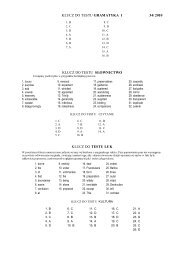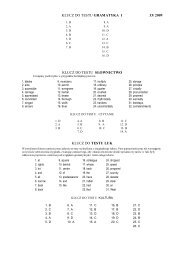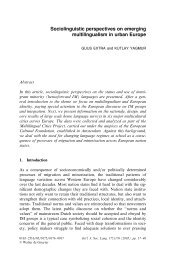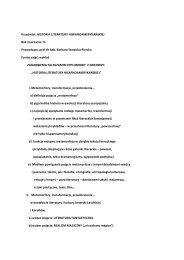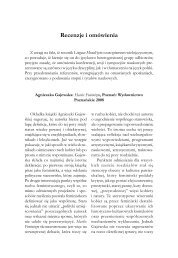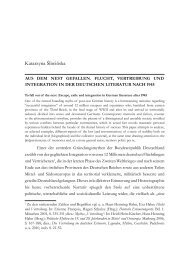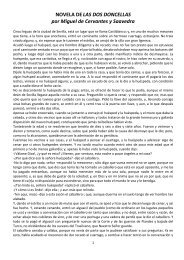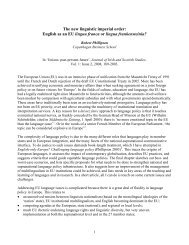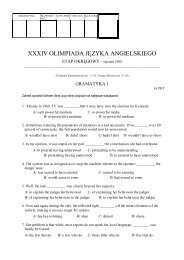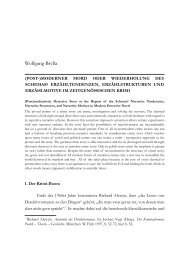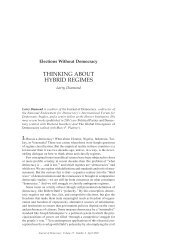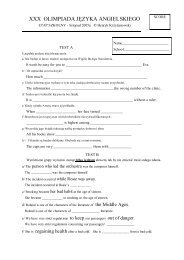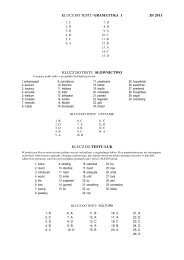African American women and feminism: Alice Walker's womanism ...
African American women and feminism: Alice Walker's womanism ...
African American women and feminism: Alice Walker's womanism ...
Create successful ePaper yourself
Turn your PDF publications into a flip-book with our unique Google optimized e-Paper software.
<strong>African</strong> <strong>American</strong> <strong>women</strong> <strong>and</strong> <strong>feminism</strong>: <strong>Alice</strong> Walker’s <strong>womanism</strong> as a proposition of a dialogic encounter 15<br />
place their anti-sexist politics within Black cultural framework rather than align<br />
it with feminist framework; however, their position should be seen as antiracist<br />
rather than antifeminist 25 . Womanism <strong>and</strong> <strong>feminism</strong> can be then viewed as potentially<br />
mutually supportive rather than exclusive or competitive.<br />
The assumption that it is possible for <strong>womanism</strong> to reconcile feminist <strong>and</strong><br />
Black nationalist perspectives can be discerned in dialogue, which is one of the<br />
womanist methods of social transformation aiming at collective well-being. Dialogue,<br />
“by which people express <strong>and</strong> establish both connection <strong>and</strong> individuality”,<br />
is “a site for both struggle <strong>and</strong> love” <strong>and</strong> is associated with the kitchen table<br />
metaphor, which connotes the woman in the centre, nourishment, egalitarianism,<br />
interpersonal relations <strong>and</strong>, last but not least, informality 26 . The kitchen table<br />
metaphor very neatly underscores the vernacular character of <strong>womanism</strong>, which<br />
Phillips connects with “the every day” 27 , possibly echoing <strong>Alice</strong> Walker’s first use<br />
of the term “womanist” in her 1979 story Coming Apart. In the story, Walker’s<br />
narrator states the following: “The wife has never considered herself a feminist<br />
– though she is, of course, a ‘womanist’. A ‘womanist’ is a feminist, only more<br />
common” 28 . This emphasis on the “common” aspect points to the womanist perspective<br />
as one that results from the suppression of <strong>African</strong> <strong>American</strong> <strong>women</strong>’s<br />
self-definition in traditional sites of knowledge, which relegated the expression<br />
of Black <strong>women</strong>’s consciousness to such “alternative sites as music, literature,<br />
daily conversation, <strong>and</strong> everyday behavior” 29 . However, dialogue as a womanist<br />
method may also be considered as acknowledging the <strong>African</strong> presence in<br />
<strong>African</strong> <strong>American</strong> culture, which insists on the <strong>African</strong>-based call-<strong>and</strong>-response<br />
dialogic pattern preserved in the Black vernacular oral tradition.<br />
Making Woolf ’s text speak<br />
<strong>Alice</strong> Walker’s 1974 title essay of the collection In Search of Our Mothers’ Gardens<br />
is an example of a dialogic re-visioning of Woolf ’s A Room of One’s Own, through<br />
which the colored woman both asserts her difference from the Eurocentric<br />
category of “woman”, that is – to use Henderson’s distinction – enters into<br />
dialogue of contestation, <strong>and</strong> acknowledges affinity with Woolf, that is enters<br />
into dialogue of affirmation, to signify her position. Consequently, Walker’s<br />
essay might be read as a womanist “kitchen table” dialogue, to which Woolf is<br />
25<br />
L. Phillips: The Womanist Reader, op.cit., p. xxxiv.<br />
26<br />
L. Phillips: The Womanist Reader, op.cit., p. xxvii.<br />
27<br />
L. Phillips: The Womanist Reader, op.cit., p. xxiv.<br />
28<br />
A. Walker: Coming Apart. In: The Womanist Reader. Ed. L. Phillips, op.cit., p. 7.<br />
29<br />
P. H. Collins: Black Feminist Thought, op.cit., p. 202.



